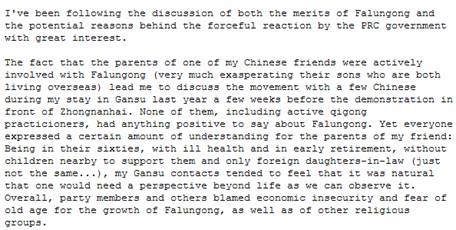From: lgerber <lgerber@wsunix.wsu.edu>
Subject: Re: H-ASIA: Falun Gong
I've been following the discussion of both the merits of Falungong and the potential reasons behind the forceful reaction by the PRC government with great interest.
The fact that the parents of one of my Chinese friends were actively involved with Falungong (very much exasperating their sons who are both living overseas) lead me to discuss the movement with a few Chinese during my stay in Gansu last year a few weeks before the demonstration in front of Zhongnanhai. None of them, including active qigong practicioners, had anything positive to say about Falungong. Yet everyone expressed a certain amount of understanding for the parents of my friend: Being in their sixties, with ill health and in early retirement, without children nearby to support them and only foreign daughters-in-law (just not the same...), my Gansu contacts tended to feel that it was natural that one would need a perspective beyond life as we can observe it. Overall, party members and others blamed economic insecurity and fear of old age for the growth of Falungong, as well as of other religious groups.
Apart from parallels to - let's say 'sectarian' - movements in Chinese history, I am wondering whether the fear apparent in the government's reaction towards Falungong is not also related to the events leading to the breakdown of Communism in Eastern Europe. (I haven't seen this discussed here, I apologize for any repetition if I overlooked it). When I talked to Protestant church leaders in Shanghai and Nanjing in 1992, several mentioned that the role of Protestant churches in East Germany in the Fall of 1989 had alarmed the Chinese Communist Party and lead to stricter control. In fact, the church leaders themselves seemed worried that rural Christian movements might endanger the relatively secure position of the offical Protestant church. Whatever the merits of Falungong (and I entirely agree with Patsy Rahn that closer scrutiny is necessary), this movement appears to give some of its members the courage to face whatever the government holds in stock for them. In this aspect, they remind me of the biographies of Chinese Communist heroes of the 1920s and 30s. This courage and personal freedom would make any leadership lacking in popular support nervous. in particular, I believe, one that seems as remote from its own heroes and ideals as today's Chinese ganbus.
Sincerely,
Lydia Gerber
Washington State University
(Msu.edu, March 13, 2000)

Original text from: http://h-net.msu.edu/cgi-bin/logbrowse.pl?trx=vx&list=h-asia&month=0003&week=b&msg=rWZr1vEf4r1LxLVJJlXZgQ&user=&pw=